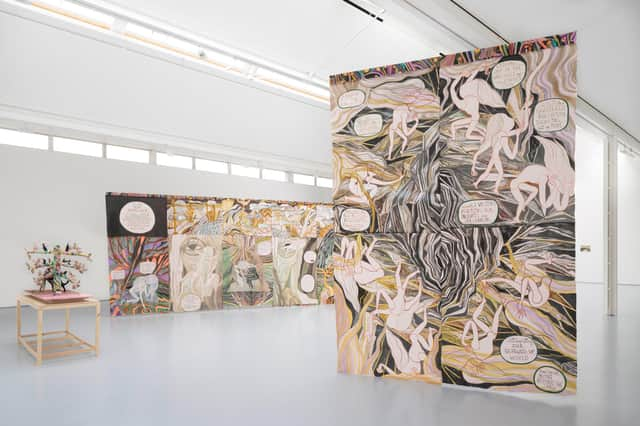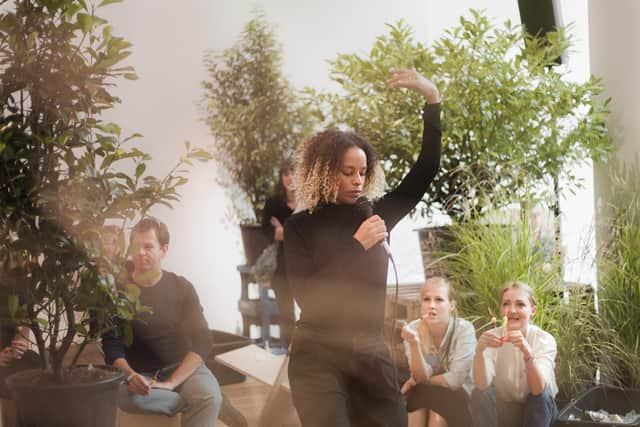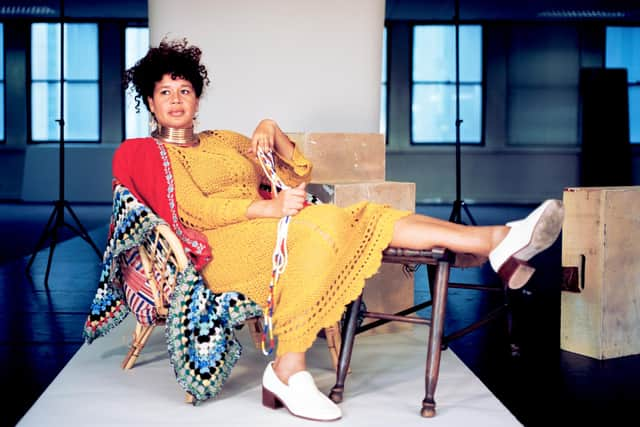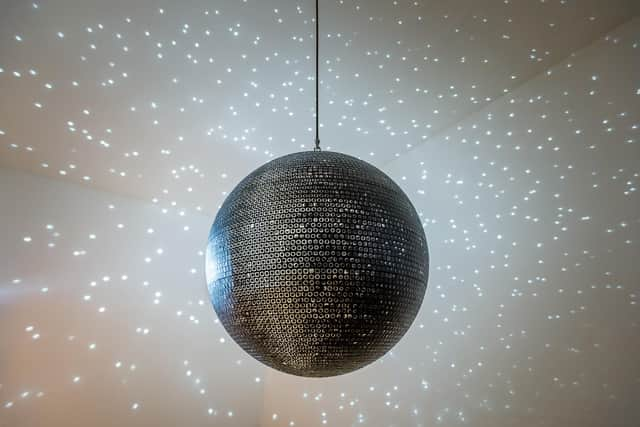Healing and Beauty: Moira Jeffrey on the power of art in a crisis


I started a new job this January. When I see my friends and colleagues in the arts, among them artists who are dealing with plummeting incomes through cancelled opportunities and postponed exhibitions, and the folk holding arts organisations together as their funding models collapse, I know how lucky I am. But like many of us, I’ve sometimes struggled to come to terms with the changed pattern of days on screens, grappled with work and family worries, and wrestled with home education.
As the incoming director of Scottish Contemporary Art Network (SCAN), the member-led network that champions and connects the contemporary art community, I’ve seen the amazing work that our members do from Shetland to the Scottish Borders. During the summer I felt a visceral thrill at my first forays back into real art galleries and museums, enjoying Stuart Whipps’ show at Dundee Contemporary Arts, and Katie Paterson’s gorgeous exhibition at the Scottish National Gallery of Modern Art. At a time of loss, loneliness and challenge, many people have been turning to culture for both solace and sense-making, and I sure am one of them.
Advertisement
Hide AdI’m missing my SCAN colleagues dreadfully at the moment. Earlier this year I caught Sekai Machache’s work for the Black Lives Matter Mural Trail in Dundee and I can’t wait for her forthcoming exhibition at Edinburgh’s Stills Gallery, which is due to open in May. Myriam Mouflih, whom I also work with, had a programming fellowship at the Berwick Film Festival in the autumn and some of the legacy podcasts are still available online. So while I bash away at my keyboard, I can listen to Myriam in conversation about black history with the exciting young British artist Rhea Dillon, or talk about colonialism with Cyprus-born Maria Anastassiou.


I think where lockdown has slowed the pace of the art world, it has also opened up new spaces like these, and afforded time not just to experience art works themselves but to listen more carefully to the voice of artists. If there’s one voice from Scotland I’d urge everyone to listen to right now it’s that of Alberta Whittle, who will represent Scotland at the Venice Biennale in 2022. Born in Bridgetown, Barbados, Whittle lives and works in Glasgow and is a Research Associate at The University of Johannesburg. Her art consists not just of the performance, prints and sculptural installation she makes, but her personal commitment to change and her investment in a vital community of artists and creatives of colour in Scotland. At SCAN we’ve been lucky enough to have her wise counsel on our board of Trustees.
Whittle, who had a knockout show at Dundee Contemporary Arts in 2019, won the prestigious Frieze artists award in 2020. We know that one of the terrible side-effects of the pandemic has been the way it has acted as an accelerant force, providing fuel for the decimating slow burn of poverty, racism, poor housing and precarious working conditions. Whittle is one of many artists who have long raised their voices about the ravages of inequality. Her latest film, Reset, is available to view on the Frieze website. It beings with the soft and steady voice of the artist herself. “I’m trying to learn how to heal,” she explains, as she leads the viewer through a guided meditation, and then beyond to a beautiful, fractured narrative of loss and recovery.
Images of moon and tide form a visual heartbeat to themes of the Black Lives Matter movement and the anxieties of the pandemic. There are counterpoint moments of healing and beauty through ritual, poetry and exquisite movement in scenes choreographed and performed by the dancer Mele Broomes, some of which were recorded in the lovely garden at Jupiter Artland outside Edinburgh.
I live in an upstairs tenement but like many people my window boxes, my local park and my back green have been my salvation. In Edinburgh, the eminent photographer Wendy McMurdo turned to recording her small city garden in a difficult summer as she grieved the loss of her mother. Her series of photographs, Night Garden, were shown at Climate House at the Royal Botanic Garden in Edinburgh and can be found on the artist’s website. They capture the unexpected glory of her giant Himalayan Lily. It appeared unexpectedly, reached 3.5m tall and flowered for the first time after seven years in which it had lain dormant. Its glossy fecundity at such a terrible moment stands as a reminder of the blazing sunshine and emotional hardship of a year like no other.


If you weren’t gardening last year, you might have been baking bread. A slice of sourdough by Freedom Bakery, who teach Scottish prisoners how to bake, is among the poignant objects featured in Lorna Macintyre’s bittersweet photographic print Glasgow Artefacts 2020. Lorna’s print is one of a number of works I’ve bought through Artist Support Pledge, a brilliant initiative by artist Matthew Burrows that helped many artists put food on their table this year. It’s a simple Instagram hashtag, that allows you to connect with artists selling their work directly online for no more than £200. You can find out more at www.artistsupportpledge.com
Advertisement
Hide AdWhen in the park I’ve also caught up with The Common Guild’s project In the Open, digital sound works by artists including Glasgow’s Luke Fowler, designed to be listened to on your phone during daily exercise. This month I’ve started listening to Everything Permitted, Luke’s new monthly show on Clydebuilt Radio, a “whole gamut of sound and music” through SoundCloud. It’s not necessarily an escape – Luke’s impressionistic soundscapes might include a snippet of a radio 4 news bulletin on the twilight of the Trump presidency, alongside some experimental music – but it has helped me see this strange time in some context: it’s good to know that artists still want to be adventurous and take formal risks and essential, politically speaking, that our current isolation should not turn us inward.
As I write, I’m thinking of my members who face continuing uncertainty. It will be SCAN’s work this year to amplify their voices as well as celebrate their undoubted successes. At DCA, MaxMara prize-winner Emma Talbot has a new show of autobiographical drawings and paintings ready to open as soon as circumstances allow. In June, I look forward to the delayed Glasgow International festival. The same month I also hope I might be able to visit Skye to see work by the Berlin artist Isabel Lewis. It’s part of Shetlandic curator Helen Nisbet’s fabulous Art Night London programme, which this year will extend far beyond the metropolis.
Advertisement
Hide AdOn my wall I can see my planner for the year ahead. It’s a beautiful limited edition screen-print by the Glasgow painter Charlie Hammond. Charlie makes these every year, but this winter it is particularly poignant. I’m desperate to get back to galleries, and I can’t even dare imagine the joy of going to an opening night with friends. But even here, stuck at my screen in this rather bleak January, my 2021 plans will be framed by an artist’s hand.


Moira Jeffrey is director of the Scottish Contemporary Art Network (SCAN), a not-for-profit charitable organisation which aims to bring the contemporary visual art community together and link in with wider conversations through projects, events and online resources. For more information, visit https://sca-net.org
A message from the Editor
Thank you for reading this article. We're more reliant on your support than ever as the shift in consumer habits brought about by coronavirus impacts our advertisers.
If you haven't already, please consider supporting our trusted, fact-checked journalism by taking out a digital subscription at https://www.scotsman.com/subscriptions
Joy Yates, Editorial Director